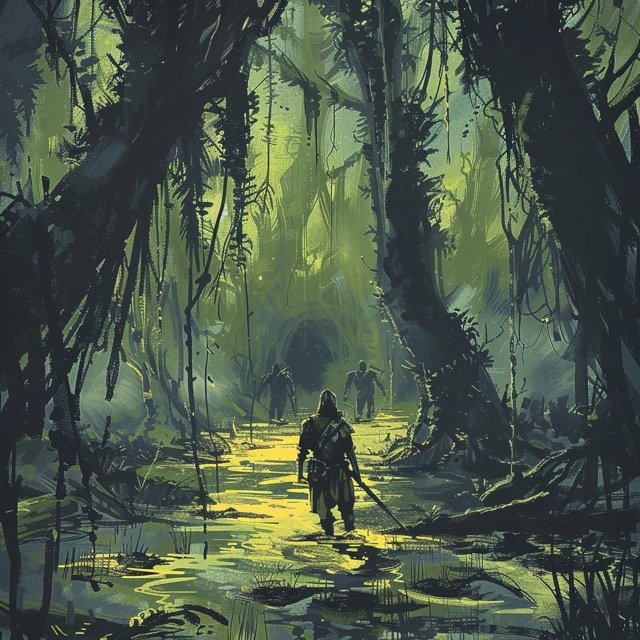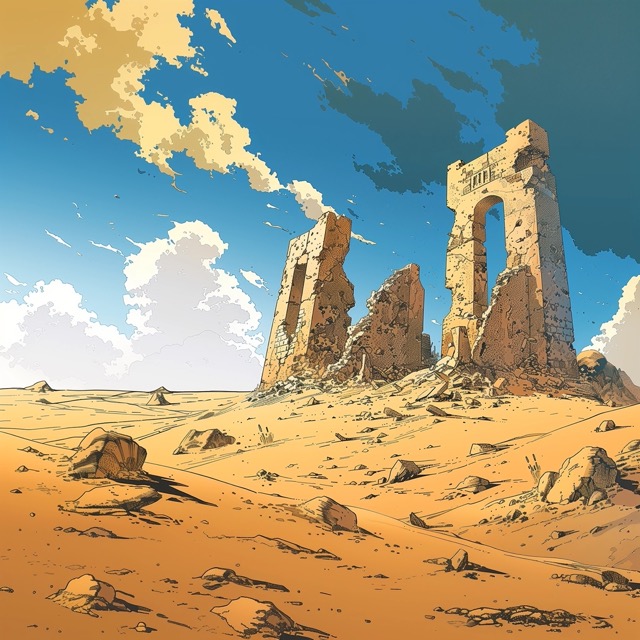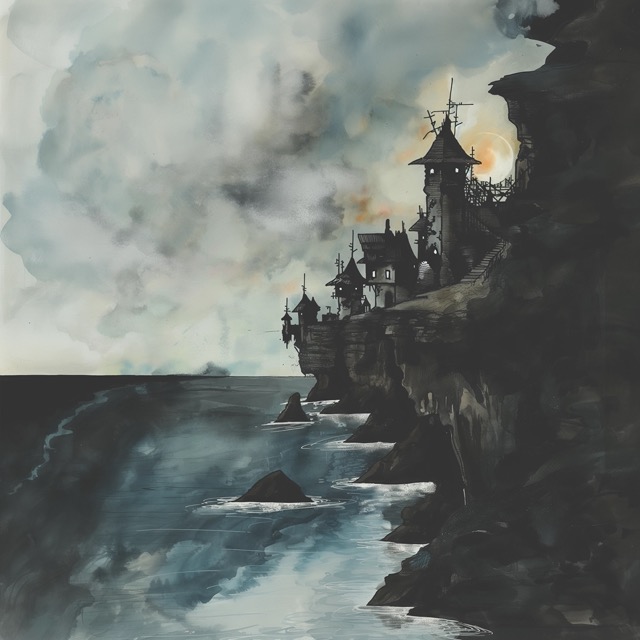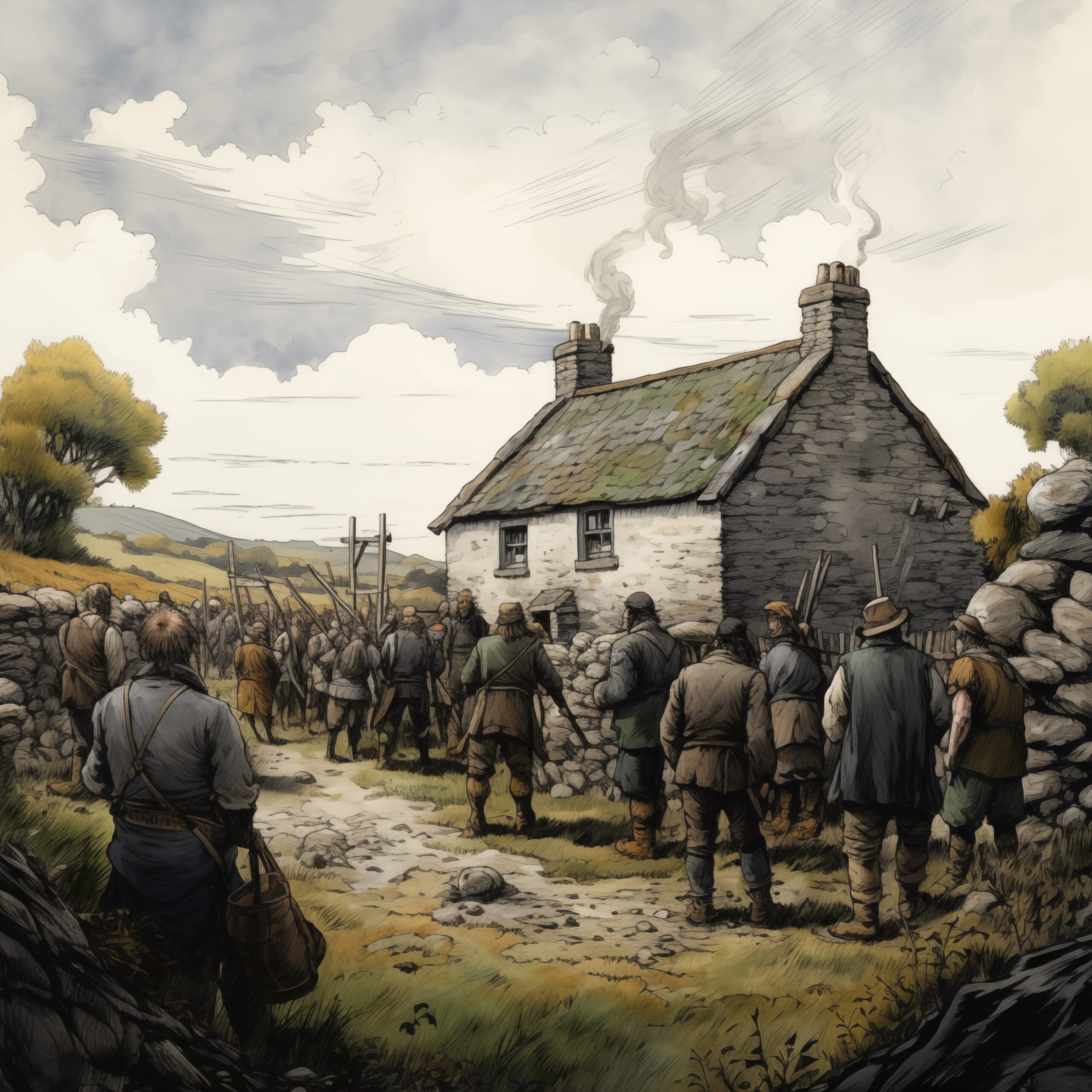Agent Salbrand on the Booley Swamps Mire Lord

Agent Viroc Salbrand (687-759 AE) was a liaison to the highly secretive Office of Inter-Amal Affairs, which reports directly to the Executor of the Imperial Catechism. Held in high esteem by the courts and advisors to Emperor Rorei the Young, Salbrand’s reports are only now being made available to the public after close review by the current Executor.
“We were out on the new trade path to Ussorn, quite eager for a chance to bring our wares to the northeastern Booley region which for some time now has something of an issue for us simple merchants, unable to contend with certain wealthier trading companies shifting so much stock up the Boern River there’s nary a space for us! But the swamps are more than treacherous, so we take all the long ways around. Until the Emperor saw fit to carve the new trade path by drainage and roads — and we are thankful, believe us. Of course it’s hard to maintain, and as such, well, we got lost. It splits so much, you see, and the maps aren’t all updated, and you can guess who buys up the stock of them the second they come out. Well, we got lost, the sun was beginning to sink, and we despaired of spending a night in the depths of a stinking swamp, when maybe four or five people, I can’t quite recall, came out of the reeds on a little raft. We were terrified until they called out, and by all rights were very friendly, offered us shelter, which we took, and we even made a few sales. Odd folk, though, every second thing out of their mouths I swear was about some ‘Mire Lord.’ Couldn’t tell you anything more, we didn’t see much but a lot of tended gardens with funny flowers and we didn’t ask, but apparently we weren’t the first they’d found wandering around.”
Transcript of a statement from three merchants lost on a new trade route through the Booley Swamps, delivered to an eastern Catechism chapter house on the afternoon of the 17th via a highway patrolman.
I had been staying as a guest in a chapter house east of the capital when its marshal, Bragi Herralos, received a missive informing him of the information in the attached statement. He was somewhat short-staffed at the moment, as some of the eastern chapters can be, and, considering my reputation among the Catechism for investigations into religious or magical matters, called upon me to look into this report, to which I of course agreed.
I entered the Booley Swamps on the 19th, without a current map but confident in my tracking abilities, despite the many challenges these swamps face for even seasoned agents, and of course the Catechism resources that inevitably vanish within them.
I spent nearly a full day on foot in the curious close air and stench of the place, heading as far inland on the new route as I could. The merchants did not lie: The roads do diverge quite a bit, and those further inland are rather overgrown due, I assume, to the virulent nature of the swamp.
I am ashamed to admit that, for the first time in many years, I found myself suddenly off track and lost within the wild grasses and sodden earth of the swamp interior. The good folk in the Imperial Transit Commission and the Surveyor’s Guild might consider a revised planning strategy in these lands, for safety’s sake. I took a fall down a crumbling incline, whose treacherous nature had been concealed by the various growths of strange flora native to this deep swampland. My leg was quite badly sprained and I was ill-prepared for escape, but escape I had to, for nightfall would lead only to further disaster.
I dragged myself through the mud for about an hour before the sound of sloshing in an expanse of scum-laden lake caught my attention. I was of course armed with a short sword for hacking away vegetation, but in poor condition to defend myself. As luck would have it, I had no need to.
Emerging out of the tall reeds there came five figures in large, loose, brown and green clothing. Would have been fine camouflage were it not for their smiling, ruddy faces and calls to me, and it was for this purpose, and likely my injury, I met them in kind, not thinking they were simply trying to get me to drop my guard.
They took me upon their raft and ferried me back to a floating village surrounding a great tall mound rising from the murky waters of the still lake. They explained that they had in fact been looking for me. There was a warning, apparently, of life in danger, given to them by the “Mire Lord.” This quite naturally raised alarms in my mind, and re-asserted the notion that they were some swamp-dwelling cult recently unearthed by the trade route. All kinds do indeed dwell in far-off places, as the Catechism well knows. I let them take me to a low, wide hut by the water, where I was laid out on a bed of dried moss and my leg seen to.
I watched an old woman enter the room. She introduced herself as Kannah, then very seriously considered my injury in an obscure rustic dialect. It was here my assertion was, as so often happens, confirmed. Kannah bid one of the men to fetch a “blessing bloom” from outside, and a moment later he returned and offered it to her with a bow. It was a flower with a set of large, amaranthine, bell-shaped petals, and very fragrant it was, too. She took a small stylus then, and, with a pot of some ochre nearby, inscribed a mage’s Bind upon one of the long petals. She went then to my raised leg and applied the Bind there. It took the form of a short rectangle, with the central, personal Bind surrounded by refining symbols to dictate specifications of the spell. No hedge wizards were they, for the Binds were applied with nothing less than the utmost skill and, I must say, reverence.
In some few moments my leg began to relax and motion returned to it. I thanked them profusely, to which they said it was their duty to help — the “Mire Lord would see it done. I inquired then as to who they were, though I was conscious not to be rude. Kannah, a sort of member of the village elders, told me they are the “faithful of a god of deep life, a swamp is a bed of life, the Mire Lord was drawn here and blesses it, and gifts its priests with powers to promote the growth of life.”
It seems they worship an Uncanny, and I could guess the roads were suffering such swift overgrowth due to this entity’s influence on the region. They were forthcoming with some information, namely that it was abhorrent to them for Binds to be used with abandon, and that the materials for their “holy works” were small gardens of well-cultivated flowers, the “blessing blooms” of before. To destroy any other life in this manner was anathema to them.
I accepted their offers of hospitality to an extent, for I was eager to return to the chapter house and report back. They are a simple folk, and walk about their rank, humid domain with a sort of subdued joviality. Every scrap of lichen and drooping fern and hanging moss catches their eye. The great central mound, I understand, is their temple. The Mire Lord dwells within, and, true enough, in the mist and haze which hangs omnipresent in the air, I saw, past worshipers in the mud near the base of it, a vague shadow rise periodically, and descend again, and heard the sound of a great form larger than any fauna I’m aware of sloshing languidly in the thick waters.
This agent’s suggestion to the Catechism is that these folk are a religious commune of practically no threat, though opening official communication with them would be a boon to the region for ethnographers, merchants, and transport authorities. Investigation into their “blessing blooms” is warranted.
Otherwise I believe can be left to their own devices.
—V.S.




